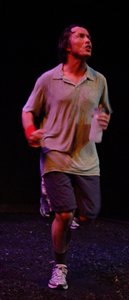In darkened surroundings, the set for Marathon consists only of a large rectangle of loose road chippings where our two protagonists Mark (Brian Hutton) and Steve (Matthew Ralli) jog. True to the title of the play, they do actually run for the majority of the 55 minute performance. As real as their running is, we are also always aware that it’s metaphorical through and through. The area of road and our two heroic joggers are well-lit in contrast to the darkness around them. It is, after all, night time as they conduct their ritualistic exercise. The ostensible goal of their punishing training is the New York Marathon.
 A contrast is set up between Mark and Steve. The former, who here in this production brandishes a Northern Irish accent, is all reluctance and distinctly lacking in enthusiasm for the run ahead, as the two men limber up before they embark on their oft taken trek together. Steve, who has more of an English accent, is the opposite. He appears genuinely fit and is almost comical in his eagerness to start out as he talks of the need to beat their previous best time while he indulges in some extreme warming-up routines. As they jog, these two contrasting personae are maintained. We are lead to understand that Mark is something of a hypochondriac and Steve invariably sets the pace.
A contrast is set up between Mark and Steve. The former, who here in this production brandishes a Northern Irish accent, is all reluctance and distinctly lacking in enthusiasm for the run ahead, as the two men limber up before they embark on their oft taken trek together. Steve, who has more of an English accent, is the opposite. He appears genuinely fit and is almost comical in his eagerness to start out as he talks of the need to beat their previous best time while he indulges in some extreme warming-up routines. As they jog, these two contrasting personae are maintained. We are lead to understand that Mark is something of a hypochondriac and Steve invariably sets the pace.
As we admire the fitness levels of Brian Hutton and Mathew Ralli who surely must have trained to stay jogging for at least 90 per cent of the time, we are treated to the various grudges, disappointments and hopes of Mark and Steve. There’s mention of a former girlfriend of Steve, Anna, whom Mark stole and it still rankles. Steve also seems a little too intense and obsessed with his training. For him, failure to train successfully and quit will be a sign of failure in life. Most of the time, Steve is in the ascendancy as they run but at a certain point the tables are turned when Steve has a problem with his stomach or with his “spleen” as they call it.
Brian Hutton and Matthew Ralli deliver extremely fine performances not least because as they interact verbally and joust with one another in their dialogue they have to simultaneously produce a variety of puffing and groaning and the slowing and quickening of the pace in their maintenance of what are technically admirable running styles. There’s a lot of humour in Marathon, too, mostly from the characters of both protagonists. Even though they appear as quite opposite types their jogging together obviously is a bonding exercise as much as exercise for a marathon. The bare set seemingly set in a nowhere or timeless space emphasises their essential aloneness.
Of course, as you might expect, things take a darker turn but Marathon never runs out of steam. Niall Cleary’s direction strikes a perfect balance between allowing the actors to relax into their roles and yet keeping them on their toes so that neither their jogging nor their verbal jousting nor their quick-fire wit ever slackens off or loses pace. You may need a sharp intake of breath to absorb the shock at the end but Marathon and its novel format is very healthy food for thought.
Patrick Brennan is a journalist, critic and lecturer and is currently writing a book on the theatre of Tom Murphy.